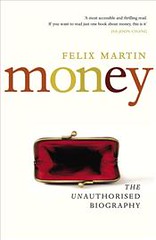
PREV ARTICLE
NEXT ARTICLE
FULL ISSUE
PREV FULL ISSUE
BOOK REVIEW: MONEY: THE UNAUTHORISED BIOGRAPHYGeorge Kolbe writes: My friend Marvin Lessen forwarded a recently published book review in which the author advances a startling assertion, summarized by the reviewer: "He uses the discovery on Yap to debunk standard textbook theories…there is little evidence any society ever relied on barter, for all the long-standing claims to the contrary."
Thanks. Here's an excerpt from the review.
-Editor
This revolved around an unwieldy coinage called fei, created from hefty stone wheels up to 12 feet in diameter. These were rarely handed over, perhaps unsurprisingly given their size; indeed, following a shipwreck the considerable wealth of one family relied on a huge stone on the sea bed under several hundred feet of water. Instead, there was a sophisticated system of credit management. “The noteworthy feature of this stone currency is that it is not necessary for its owner to reduce it to possession,” wrote the adventurer. After Furness’s travelogue was published in 1910, a copy found its way to John Maynard Keynes – and the man who was to become the century’s most influential economist proclaimed that modern experts had much to learn from the Pacific islanders’ philosophical approach to currency. One other leading economist extolled the wisdom of Yap some eight decades later: Milton Friedman, far from Keynes’s ideological soulmate. And now Felix Martin, an economist and City fund manager, has seized upon their story for the foundation stone of his enjoyable exploration of money. He uses the discovery on Yap to debunk standard textbook theories that money evolved from societies frustrated by the obvious limitations of barter. Here was an economy so simple it would have been easier to simply swap some fish or coconuts when wanting a nice sea cucumber. Indeed, Martin claims a consensus is emerging among anthropologists that there is little evidence any society ever relied on barter, for all the long-standing claims to the contrary. The author believes Yap does not simply challenge conventional theories of money’s origins, however. Far more profoundly, he says it should challenge our conception of what money actually is – for it is not something tangible, based on precious metals such as gold and silver. This, he argues, gives too much weight to the surviving historical evidence of metal-based coins and the views of muddle-headed economists and philosophers. To read the complete article, see: It makes the world go round (www.ianbirrell.com/it-makes-the-world-go-round/)
For more information, see:
Money: The Unauthorised Biography
(www.randomhouse.co.uk/editions/money-the-unauthorised-biography/9781847922335)
The Numismatic Bibliomania Society is a non-profit organization promoting numismatic literature. See our web site at coinbooks.org. To submit items for publication in The E-Sylum, write to the Editor at this address: whomren@gmail.com To subscribe go to: https://my.binhost.com/lists/listinfo/esylum All Rights Reserved. NBS Home Page Contact the NBS webmaster 
|
